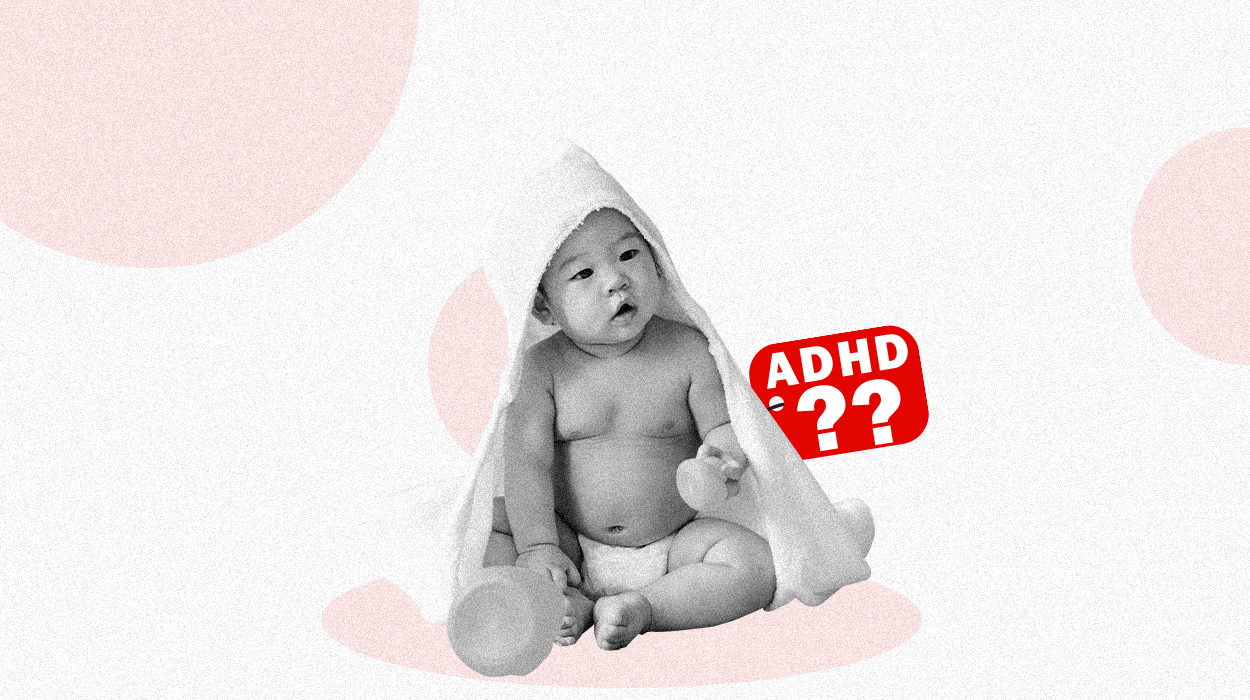 Expert's opinion
Expert's opinion
Expert's opinion
The article is a subjective view on this topic written by writers specializing in medical writing.
It may reflect on a personal journey surrounding struggles with an illness or medical condition, involve product comparisons, diet considerations, or other health-related opinions.
Although the view is entirely that of the writer, it is based on academic experiences and scientific research they have conducted; it is fact-checked by a team of degreed medical experts, and validated by sources attached to the article.
The numbers in parenthesis (1,2,3) will take you to clickable links to related scientific papers.
ADHD In Toddlers: Early Signs, Treatments & Tips 2024

Many people suffer from attention-deficit/hyperactivity disorder. Surprisingly, it is expected that most people with ADHD will develop another mental health disorder at some point in their lives. Behavioral or conduct concerns, learning disorders, anxiety, and depression are the most prevalent ADHD comorbidities.
Although ADHD can affect both children and adults, However, parents frequently worry that their little one may show signs of ADHD. However, parents frequently worry that their little one may be showing signs of ADHD, which is understandable given that symptoms of ADHD can appear as early as the toddler years.
Does my toddler have ADHD? To answer this question, continue reading for a more in-depth explanation of the symptoms, causes, treatments, and recommendations for ADHD in toddlers.
Can Toddlers Have ADHD?
Despite the lack of standardized ADHD diagnosis criteria, an expanding body of evidence indicates that ADHD symptoms appear in children before age four.
Suppose your toddler’s impulsive, inattentive, and hyperactive behaviors persist even after they begin elementary school; it may be appropriate to meet with your childcare provider to see whether they observe similar tendencies.
Signs Of ADHD In Toddlers
The American Academy of Pediatrics describes toddlers as kids between the ages of 1 year and 3 years. The following are the major red flags that may drive you to diagnose ADHD.
- Inattention.
- Hyperactivity.
- Impulsivity.
The three basic signs of ADHD in toddlers can manifest in various ways, and a toddler with ADHD may exhibit some or all of them. If you notice that your toddler is more active and impulsive than other toddlers their age, make a mental note of it, keep a close eye on their behavior, and seek help for your child if their actions are extreme and affecting their activities and relationships.
The following are some examples of ADHD symptoms in toddlers:
- Their behavior appears inappropriate or unpleasant for their age, for example, an ADHD child hitting parents.
- They frequently engage in disruptive behavior.
- They appear to be not listening or paying attention most of the time.
- They continuously shift in their seat or fidget with their hands or feet.
- They run or climb excessively.
Diagnosing ADHD In Children
Although ADHD symptoms in preschool-aged children occasionally appear, diagnosing the illness in very young toddlers is challenging. Specialists should diagnose children with a Confirmation of any ADH, such as a developmental pediatrician, speech pathologist, or psychiatrist/psychologist.
Confirmation of any ADHD diagnosis in children should be done by a specialist, such as a developmental pediatrician, speech pathologist, or psychiatrist/psychologist.
At the first appointment, you can discuss specifics about your toddler’s symptoms, such as when and where they began. After evaluating your child for early warning signs vs. typical toddler behaviors, the specialist can provide strategies to promote growth in any areas that concern you.
Your child must meet the following criteria[1] for an ADHD diagnosis:
- Exhibit a minimum of six ADHD symptoms of inattention.
- Exhibit symptoms in two or more settings, including academic, residential, and social settings.
- Have been experiencing symptoms for at least six months.
- Exhibit symptoms that interfere with your child’s ability to participate, typically in home, school, or peer environments.
What Are The Causes Of ADHD
It is still unknown what causes ADHD in children; however, most specialists feel that it is a genetic disorder[2] and that children with ADHD have changes in brain chemistry that make them more prone to symptoms. Let’s take a deeper look at these two points below:
Genetics
Many people diagnosed with ADHD have a history of the disorder running in their family.[2] One out of every four children diagnosed with ADHD is said to have a parent who also displays symptoms of the illness. There is a good chance that a member of the close family, most typically a sibling, also has ADHD. It is not uncommon for parents to be diagnosed with ADHD simultaneously with their children.
Brain Chemistry And Mental Processes
According to research, children with ADHD develop their prefrontal cortex at a slower rate than children who are normally developing. The size is also slightly reduced. This results in abnormally low neurotransmitters dopamine and noradrenaline levels, which ordinarily relay information between the prefrontal brain and the basal ganglia. Individuals with low dopamine levels will try to replicate that rewarding sensation in other ways.
Risk factors of ADHD in toddlers include
- Prenatal exposures such as maternal alcohol and drug abuse.
- Exposure to toxins in the environment, such as lead or mercury.
- Prematurity.
Contrary to popular belief, there is no evidence that high blood sugar causes hyperactivity. Furthermore, many youngsters struggle to focus, but not all have ADHD.
Treatments For Toddlers ADHD
The diagnostic and statistical manual has recommendations for treating ADHD in 4-year-olds and 5-year-olds; however, there are currently no recommendations for treating ADHD in toddlers. The Centers for Disease Control suggests that for preschool children with ADHD, behavioral therapy is a treatment option that is both safe and effective.[3]
So, just what is behavioral therapy?
Children with ADHD have shown remarkable improvement with behavioral therapy, often known as behavior modification. Positive reinforcement, consistent discipline, and ADHD baby talk are just some of the strategies that caregivers can learn from a therapist during behavior treatment to help them better manage the child’s actions.
Tips For Parents Of Toddlers With ADHD
Because an ADHD child needs constant attention, parental involvement in ADHD treatment has a significant impact. If you provide your toddler with a healthy lifestyle that includes a balanced diet, regular exercise, and other helpful behaviors, they may find it easier to control their ADHD symptoms. Consider the following tips to assist your child in dealing with ADHD.
- Recognize and reward positive behavior: Positive behavior should be commended more frequently than negative behavior to create and reinforce positive behavior.
- Adequate sleep: It has been proven that if children get enough sleep,[4] the symptoms of ADHD are significantly reduced.
- Nature benefits: Try to get your youngster to spend at least 15 minutes every day outside, playing in the fresh air.
- Routine exercise: For children with ADHD, hobbies such as dance or other physical activities[5] that require them to pay close attention to their body’s motions may be especially beneficial.
- Nutritious diet: Several independent studies[6] have found that the timing of meals as well as the types of foods consumed, might influence ADHD symptoms in youngsters. Research indicates that keeping saturated fat and refined sugar at a minimum in your child’s diet may reward you with manageable behaviors.
While there are many ways to help a child with ADHD at home, you may also want to seek professional help as well. A team of experts in ADHD can assist you in figuring out how to support your child best.
The Takeaways
According to the above facts, ADHD is one of the chronic mental disorders that affects millions of children and frequently lasts into adulthood. Toddlers with ADHD suffer from inattention, hyperactivity, and impulsivity.
If you suspect your toddler has ADHD, take track of the symptoms, how frequently they occur, and when they occur. The next obvious step is to discuss this with your childcare specialist. For young children, healthcare providers may recommend behavior therapy as the first line of ADHD treatment, and experts believe this is the most effective mode of delivery. It is critical to note that treating your child for ADHD as soon as it may help to reduce the severity of the illness.
+ 6 sources
Health Canal avoids using tertiary references. We have strict sourcing guidelines and rely on peer-reviewed studies, academic researches from medical associations and institutions. To ensure the accuracy of articles in Health Canal, you can read more about the editorial process here
- Drechsler, R., Brem, S., Brandeis, D., Grünblatt, E., Berger, G. and Walitza, S. (2020). ADHD: Current Concepts and Treatments in Children and Adolescents. [online] 51(05), pp.315–335. doi:https://doi.org/10.1055/s-0040-1701658.
- Faraone, S.V. and Larsson, H. (2018). Genetics of attention deficit hyperactivity disorder. [online] 24(4), pp.562–575. doi:https://doi.org/10.1038/s41380-018-0070-0.
- CDC (2020). Parent Training in Behavior Management for ADHD. [online] Centers for Disease Control and Prevention. Available at: https://www.cdc.gov/ncbddd/adhd/behavior-therapy.html#:~:text=Behavior%20therapy%20is%20an%20effective,it%20is%20delivered%20by%20parents.
- Hiscock, H., Sciberras, E., Mensah, F., Gerner, B., Efron, D., Khano, S. and Oberklaid, F. (2015). Impact of a behavioural sleep intervention on symptoms and sleep in children with attention deficit hyperactivity disorder, and parental mental health: randomised controlled trial. BMJ, [online] 350(jan20 1), pp.h68–h68. doi:https://doi.org/10.1136/bmj.h68.
- Chan, Y.-S., Jang, J.-T. and Ho, C.-S. (2022). Effects of physical exercise on children with attention deficit hyperactivity disorder. Biomedical Journal, [online] 45(2), pp.265–270. doi:https://doi.org/10.1016/j.bj.2021.11.011.
- Pinto, S., Correia-de-Sá, T., Sampaio-Maia, B., Vasconcelos, C., Moreira, P. and Ferreira-Gomes, J. (2022). Eating Patterns and Dietary Interventions in ADHD: A Narrative Review. Nutrients, [online] 14(20), p.4332. doi:https://doi.org/10.3390/nu14204332.



